The Waves of Weil Books: 1951-2024 — New and Forthcoming Books
There have been several waves of books by or about Simone Weil since the first works were published in English in the early 1950s. Three of the early waves of such books are outlined below. What is amazing, and as evidenced by the latest wave of Weil books, is that no fewer than fifteen books (including major translations and commentaries) have been or will be published within a two-year period. In short, we are witnessing yet another resurgence of interest in the life and thought of Weil.
First Wave: 1951-1958

- Marie-Magdeleine Davy, The Mysticism of Simone Weil (1951)
- Waiting on God (1951)
- Gravity and Grace (1952)
- The Need for Roots (1952)
- Perrin & Thibon, Simone Weil as We Knew Her (1953)
- Letter to a Priest (1954)
- E.W. Tomlin, Simone Weil (1954)
- The Notebooks of Simone Weil (2 vols., 1956)
- Intimations of Christianity Among the Ancient Greeks (1957)
- Oppression and Liberty (1958)
- Richard Rees, Brave Men: A Study of D.H. Lawrence & Simone Weil (1958)
Second Wave: 1962-1978
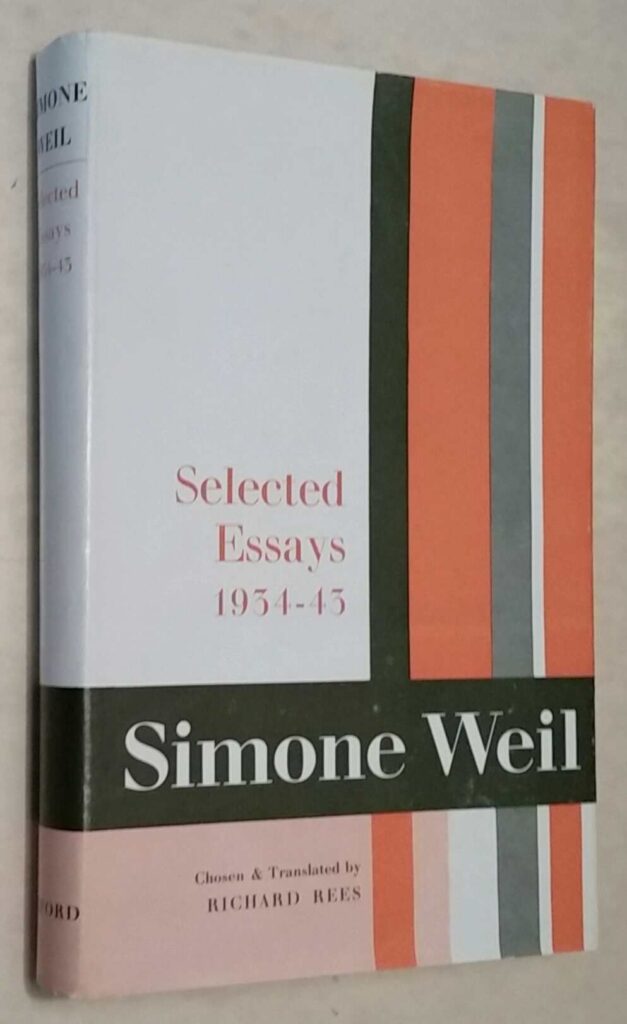
- Selected Essays: 1934-43 (1962)
- Jacques Cabaud, Simone Weil (1964)
- Simone Weil: Seventy Letters (1965)
- Richard Rees, Simone Weil: A Sketch for a Portrait (1966)
- On Science, Necessity & The Love of God (1968)
- First and Last Notebooks (1970)
- Oppression and Liberty (1973)
- David Anderson, Simone Weil (1971)
- Megan Terry, Approaching Simone (1973)
- Simone Pétrement, Simone Weil: A Life (1976)
- George A. Panichas, ed., The Simone Weil Reader (1977)
- Lectures on Philosophy (1978)
Third Wave: 1981-1989
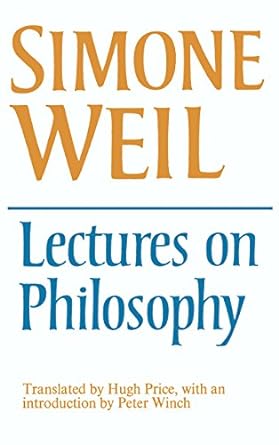
- George Abbott White, ed., Simone Weil: Interpretations of a Life (1981)
- John Hellman, Simone Weil (1982)
- Dorthy Tuck McFarland, Simone Weil (1983)
- Eric Springsted, Christus Mediator: Platonic Mediation in the Thought of Simone Weil (1983)
- Diogenes Allen, Three Outsiders (1983)
- John Dunaway, Simone Weil (1984)
- Eric Springsted, Simone Weil & The Suffering of Love (1986)
- Sian Miles, ed., Simone Weil: An Anthology (1986)
- Formative Writings: 1929-1941 (1987)
- Betty McLane-Iles Uprooting and Integration in Simone Weil (1987)
- Robert Coles SImone Weil: A Modern Pilgrimage (1987)
- J.P. Little, Simone Weil: Waiting on Truth (1988)
- Mary Dietz, Between the Human and Divine (1988)
- Peter Winch, Simone Wei: “The Just Balance” (1989)
- Blum & Seidler, A Truer Liberty: Simone Weil and Marxism (1989)
- David McClellan Simone Weil: Utopian Pessimist (1989)
- Gabriella Fiori Simone Weil: An Intellectual Biography (1989)
The Latest Wave: 2022-2024
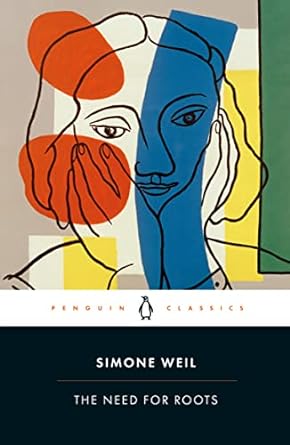
The Need for Roots: New Translation and Companion Reader
The Need for Roots: Prelude to a Declaration of Obligations Towards the Human Being, Ros Schwartz (translator), Dr. Kate Kirkpatrick (Introduction) (Penguin, Feb. 13, 2024)
Related
- “The Pleasures and Pitfalls of Translating Simone Weil,” American Weil Society (2022) (video interview with Ros Schwartz)
Translating is a formidable task. Three translators of Simone Weil’s works: Ros Schwartz, translator of Weil’s L’Enracinement (forthcoming from Penguin UK) and Philip Wilson and Sylvia Panizza, translators of Weil’s Venise Sauvée and poems (Bloomsbury Press) will discuss some of the challenges. Tess Lewis, an internationally recognized translator, will moderate the discussion.
Eric Springsted & Ronald Collins, eds., A Declaration of Duties toward Humankind: A Critical Companion to Simone Weil’s The Need for Roots (Carolina Academic Press, Jan. 31, 2024)
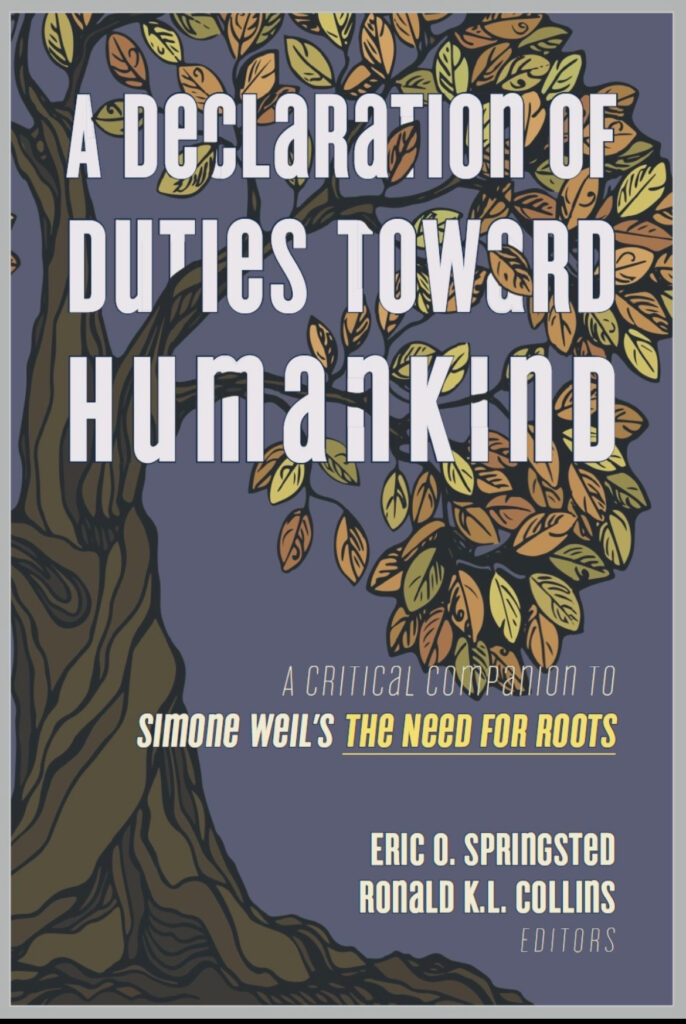
A Declaration of Duties Toward Humankind provides an instructive examination of the origin, structure, and content of the central ideas found in Simone Weil’s The Need for Roots. In this collection of original essays by noted Weil scholars from the United States, Canada, Norway, France, and Germany, the authors address the most pressing historical and contemporary aspects of Weil’s thought and her striking proposals.
Illuminating the conceptual underpinnings of The Need for Roots, this companion reader examines Weil’s substituting obligations for rights as the moral basis of society, her critique of our uprootedness and her proposals for rootedness, her understanding of our dangerous notions of greatness, the importance of work for society, and her assessment of modern science. The book draws on the latest and most reliable work on the history of the Weil manuscript as provided by French scholars. Its in-depth examination also focuses on Weil’s call for spiritual renewal, first in France, but more broadly in Western democracies. Also included in the appendices are a new translation of Weil’s preliminary study of obligations that was meant as an introduction to her work (but always published separately) as well as an original translation of an address by Free French leader André Philip—an address that helped set the moral issues that Weil came to address.
Major New Translation of Weil’s Basic Writings
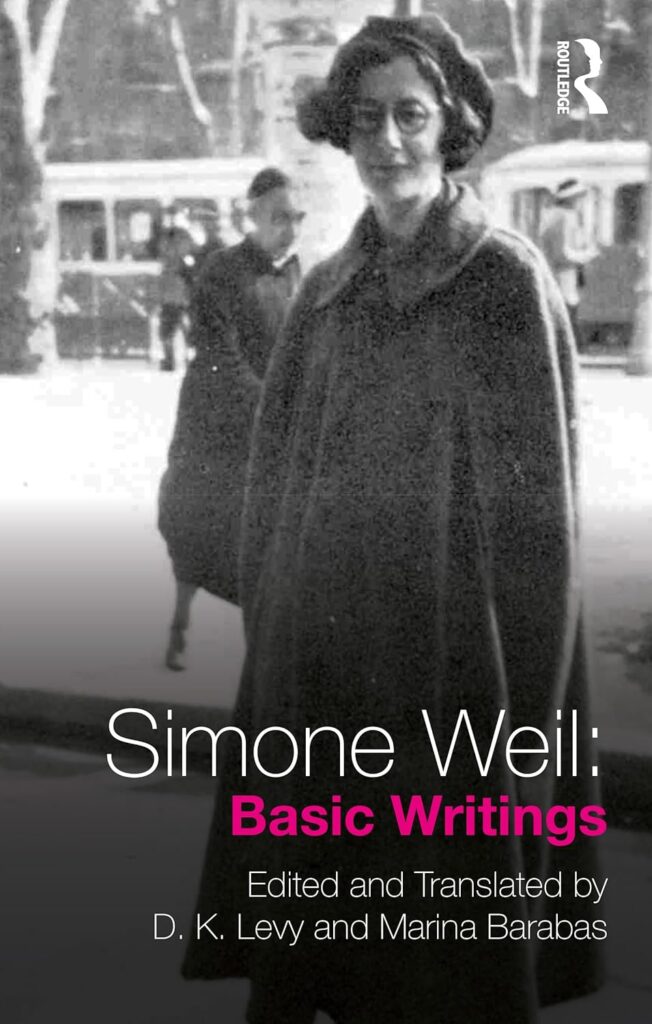
Simone Weil: Basic Writings, D.K. Levy & Marina Barabas, eds. (Routledge, Dec. 22, 2023)
D.K. Levy is a Lecturer in Philosophy at the University of Edinburgh, UK. Marina Barabas, having taught philosophy in London and Boston, is now a Fellow of the Czech Academy of Sciences.
# # # #
Simone Weil: Basic Writings is an expertly edited anthology of Weil’s most important writings, presenting her philosophy as it relates to the architecture of human nature, politics, work, necessity, beauty, goodness and God. Working from the definitive French edition of Weil’s complete writings, D. K. Levy and Marina Barabas have translated the essays anew or for the first time, adding important notes and references absent from existing English language editions of Weil’s work.
Following an extensive introduction that gives an overview of Weil’s life and thought, each section opens with a short introduction situating the selected essays within Weil’s oeuvre.
Simone Weil: Basic Writings is an invaluable entry point for students and scholars of Weil’s thought, not only in philosophy but related disciplines such as politics, literature and religion.
Part 1: Here below
Introduction to Part 1 D. K. Levy
1. Study for a declaration of obligations to the human being
2. Concerning syndicalism “Single, Apolitical, Mandatory”
3. Let’s not start the Trojan War again
4. Legitimacy of the provisional government
5. What does the Occitanian inspiration consist in
6. Prelude to a declaration of duties toward the human being
7. Is there a Marxist doctrine?
8. Reflections on quantum theory
9. Morality and literature
10. Essay on the concept of reading
11. Some reflections on the concept of value
12. This war is a war of religions
13. Are we fighting for justice?
14. Is the human person sacred?
Part 2: Mediation
Introduction to Part 2 D. K. Levy
15. Precondition of non-servile work
16. Reflections on the good use of school studies with a view to the love of God
17. Sketch of the “Commentary on Pythagorean texts”
18. Concerning the Pythagorean Doctrine
Part 3: Beyond the Sky
Introduction to Part 3 D. K. Levy
19. Theory of Sacraments
20. Forms of the implicit love of God
i. Love of one’s neighbour
ii. Love of the order of the world
iii. Love of religious practices
iv. Friendship
v. Implicit love and explicit love
21. God’s love and affliction.
Wittgenstein & Weil
Jack Manzi, ed., Between Wittgenstein and Weil (2023)
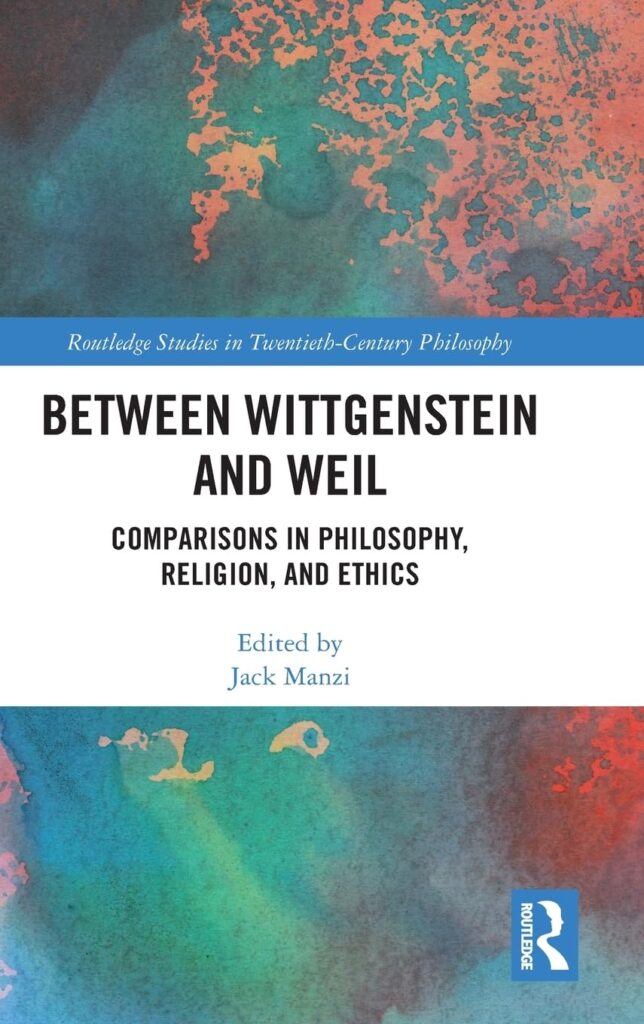
This volume explores the relationship between the philosophical thought of Simone Weil and Ludwig Wittgenstein. The contributions shed light on how reading Weil can inform our understanding of Wittgenstein, and vice versa.
The chapters cover different aspects of Weil’s and Wittgenstein’s philosophy, including their religious thought and their views on ethics and metaphilosophy. They address the following questions: How does Wittgenstein’s struggle with religious belief match up with Simone Weil’s own struggle with organised belief? What is the role of the mystical and supernatural in their works? How much impact has various posthumous editorial decisions had on the shaping of Weil’s and Wittgenstein’s thought? Is there any significance to similarities in Weil’s and Wittgenstein’s written and philosophical styles? How do Weil and Wittgenstein conceive of the ‘self’ and its role in philosophical thinking? What role does belief play in Weil’s and Wittgenstein’s respective philosophical works?
Between Wittgenstein and Weil will be of interest to scholars and advanced students working in twentieth-century philosophy, philosophy of religion, philosophy of language, and the history of moral philosophy.
Weil and The French Historical Narrative and the Fall of France
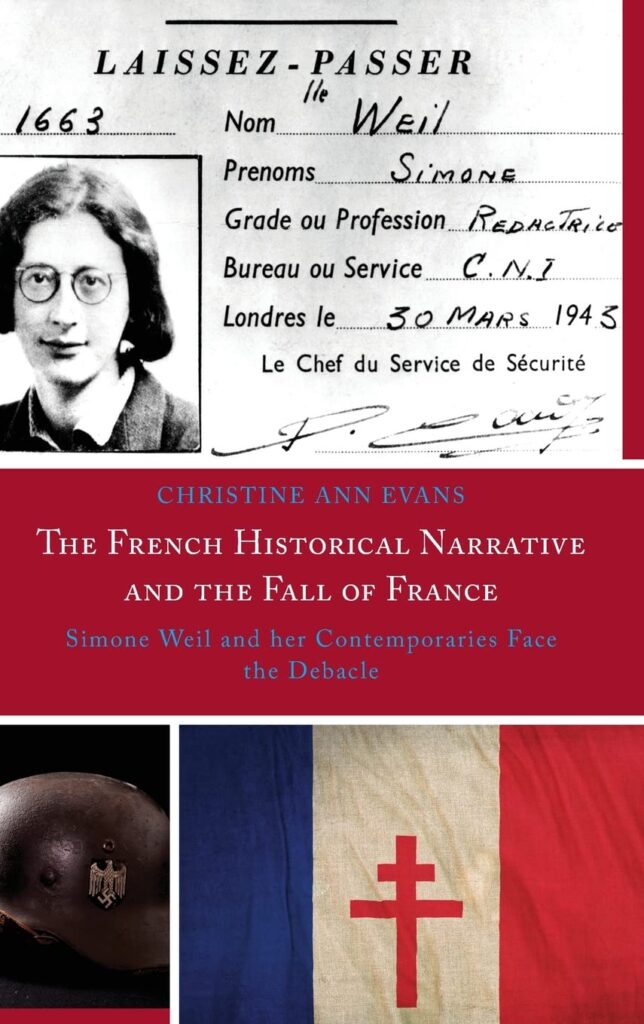
Christine Ann Evans, The French Historical Narrative and the Fall of France: Simone Weil and her Contemporaries Face the Debacle ( Lexington Books, 2022)
The fall of France in June 1940, La Débâcle, posed a challenge to France’s understanding of itself. Could the existing “sacred” narrative of French history established by the Third Republic hold in the face of the defeat of France’s military and political systems, both built upon its foundations? The French Historical Narrative and the Fall of France: Simone Weil and her Contemporaries Face the Debacle focuses on assessments of the Debacle and places Simone Weil’s writings of 1938 to 1943 within this continuum.
This study recreates the debate in those fraught years to posit a “horizon of expectations” within which to place and better appreciate Simone Weil’s writing of the period, far-reaching and bold but hardly “crazy” (as De Gaulle is said to have characterized her ideas).
Weil and Arendt
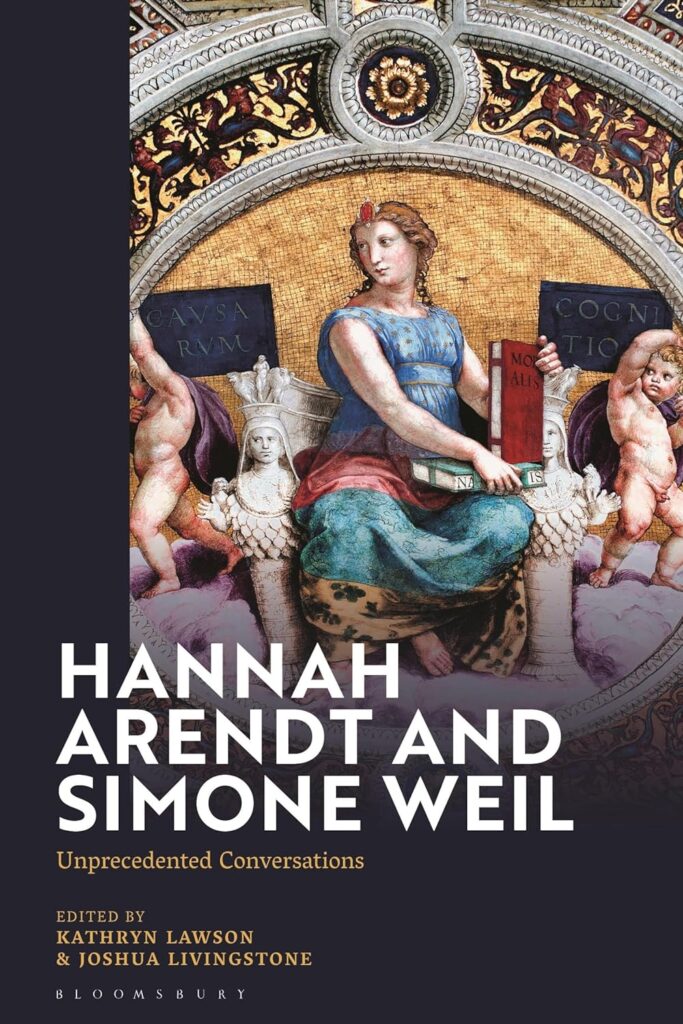
Kathryn Lawson & Joshua Livingstone, eds., Hannah Arendt and Simone Weil: Unprecedented Conversations (Bloomsbury Academic, Feb. 22, 2024)
Hannah Arendt and Simone Weil were two of the most compelling political thinkers of the 20th century who, despite having similar life-experiences, developed radically distinct political philosophies. This unique dialogue between the writings of Arendt and Weil highlights Arendt’s secular humanism, her emphasis on heroic action, and her rejection of the moral approach to politics, contrasted starkly with Weil’s religious approach, her faith in the power of divine Goodness, and her other-centric ethic of suffering and affliction.
The writings here respect the profound differences between Arendt and Weil whilst pulling out the shared preoccupations of power, violence, freedom, resistance, responsibility, attention, aesthetics, and vulnerability. Without shying away from exploring the more difficult concepts in these philosophers’ works, Hannah Arendt and Simone Weil also aims to pull out the relevance of their writings for contemporary issues.
Short Introduction to Weil’s Thought
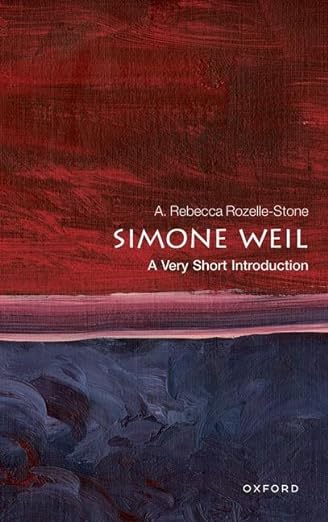
A. Rebecca Rozelle-Stone, Simone Weil: A Very Short Introduction (Oxford University Press, May 22, 2024)
This Very Short Introduction provides an overview of the intriguing and provocative life and ideas of twentieth-century French philosopher, mystic, and social activist Simone Weil. Weil was not a typical, systematic philosopher. Despite her short life, Weil’s philosophy has much to offer us in our times of personal, communal, political, and environmental crises, both in the breath and poignancy of her philosophy, and the topics it covers.
In keeping with Weil’s spirit to consider and address laypeople, Rozelle-Stone takes readers, including those who have had little or no previous exposure to Weil or philosophy, on an accessible journey of Weil’s major philosophical impacts. This exploration consists of seven chapters highlighting: her life and manner of death, both characterized by attention; the influence of ancient Greek ideas on her philosophy; her thoughts on labour and politics; her unique and ecumenical religious inspirations, stemming from Christianity, Hinduism, Buddhism, and Taoism; her ethical philosophy centred on a specific notion of attentiveness; her understanding of beauty as connected to fragility but also eternity; and finally, her legacy and influence on contemporary writers and issues, particularly as she may help us navigate and critically assess the growing convergence between religious fervour, late capitalist and corporate values, and authoritarian politics.
Forthcoming: Handbook on Simone Weil
Lissa McCullough, ed., The Bloomsbury Handbook of Simone Weil (Bloomsbury Academic, Sept. 2024)
Exploring the philosophical writings of Simone Weil, this unparalleled reference work documents the key thinkers who influenced her political, philosophical and religious outlook. It also offers a critical analysis of her wide-ranging philosophical concepts through short, accessible essays, showing how they connect throughout her writings to form an organic whole.
After outlining her biography, Part I explores Weil’s boundary-crossing interests in radical politics, science, mathematics, history, and religious phenomena. Part II traces the intellectual history of Weil’s own writings by mapping her most important philosophical influences including Plato, Descartes, Spinoza, Rousseau, Kant, and Marx. The rich landscape of Weil’s philosophy receives critical consideration in Part III through the distinctive defining terms that tie her body of thinking together: terms such as amor fati, attention, beauty, force, gravity and grace, receive full explication alongside important themes of justice, obedience, compassion, and method as they figure in her work.
A reliable scholarly framework guides readers through Weil’s expansive oeuvre, including bibliographic help with locating Weil’s writings in French and English, alongside an overview of the critical literature. For students, scholars, and lay readers who seek clarifying and comprehensive coverage of Weil’s ideas and writings, this text is an indispensable research tool.
Weil’s Literary Afterlives
Cynthia R. Wallace, The Literary Afterlives of Simone Weil: Feminism, Justice, and the Challenge of Religion (Columbia University Press, May 7, 2024)
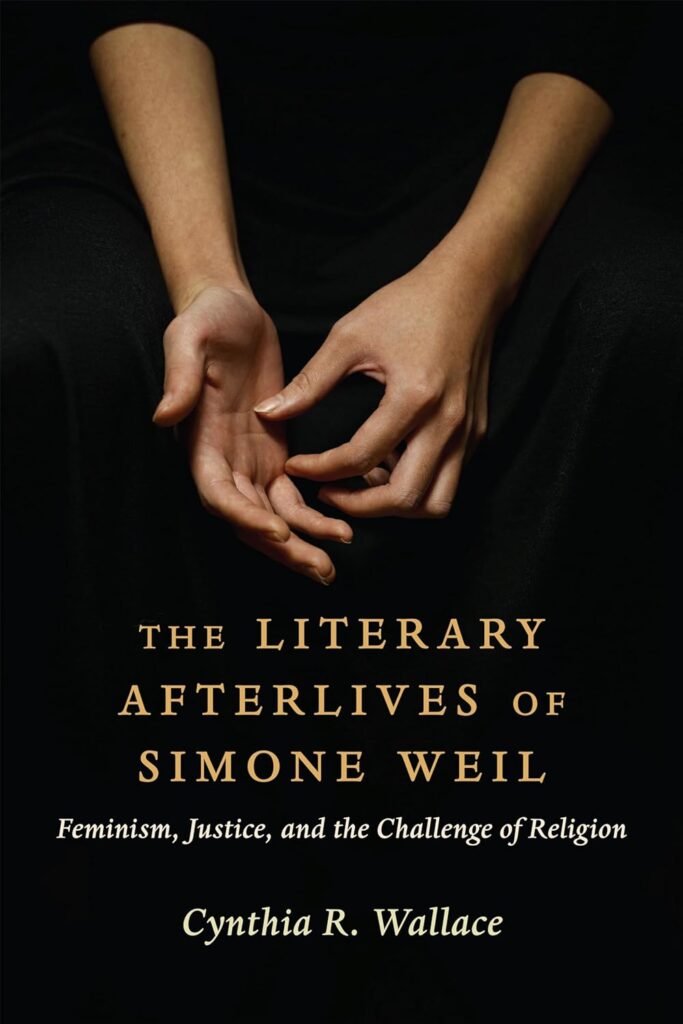
The French philosopher-mystic-activist Simone Weil (1909–1943) has drawn both passionate admiration and scornful dismissal since her early death and the posthumous publication of her writings. She has also provoked an extraordinary range of literary writing focused on not only her ideas but also her person: novels, nonfiction, and especially poetry. Given the challenges of Weil’s ethic of self-emptying attention, what accounts for her appeal, especially among women writers?
This book tells the story of some of Weil’s most dedicated―and at points surprising―literary conversation partners, exploring why writers with varied political and religious commitments have found her thought and life so resonant. Cynthia R. Wallace considers authors who have devoted decades of attention to Weil, such as Adrienne Rich, Annie Dillard, and Mary Gordon, and who have written poetic sequences or book-length verse biographies of Weil, including Maggie Helwig, Stephanie Strickland, Kate Daniels, Sarah Klassen, Anne Carson, and Lorri Neilsen Glenn. She illuminates how writing to, of, and in the tradition of Weil has helped these writers grapple with the linked harms and possibilities of religious belief, self-giving attention, and the kind of moral seriousness required by the ethical and political crises of late modernity. The first book to trace Weil’s influence on Anglophone literature, The Literary Afterlives of Simone Weil provides new ways to understand Weil’s legacy and why her provocative wisdom continues to challenge and inspire writers and readers.
Weil’s Poetry
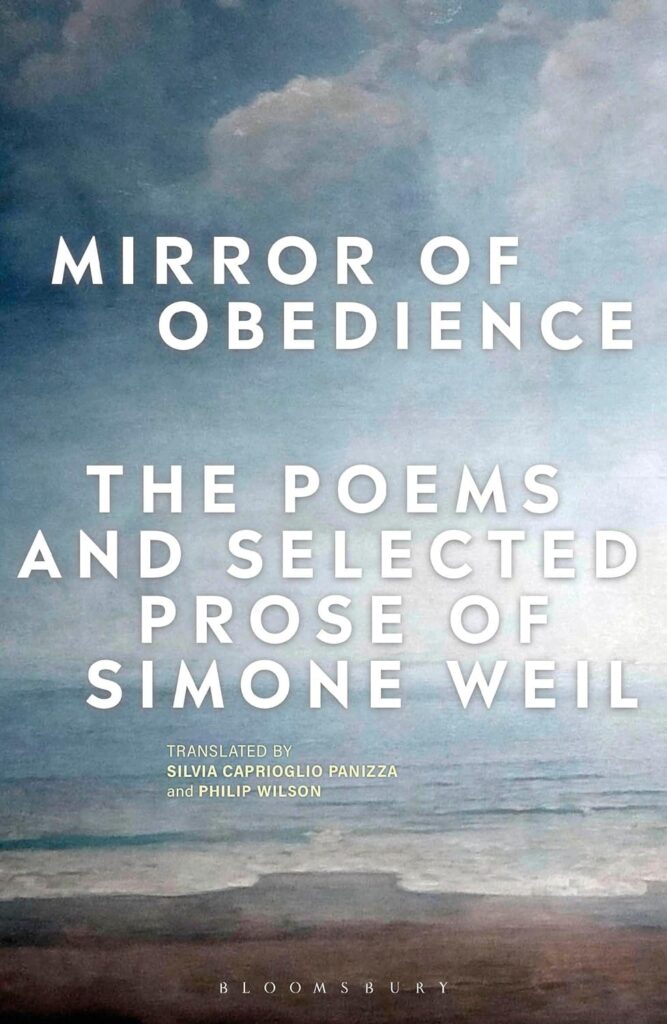
Silvia Caprioglio Panizza & Philip Wilson, eds., Mirror Of Obedience: The Poems And Selected Prose Of Simone Weil (Bloomsbury Academic, 2023)
Mirror of Obedience collects together Weil’s poetry and autobiographical writings translated into English for the first time. It offers a rare glimpse into a more personal and introspective Weil than we usually encounter. She was writing and re-working her poems until the end of her life and in a letter from London to her parents, dated 22 January 1943, she expressed the wish for her verses to appear together in print in chronological order, a wish which this volume honours.
Weil was a thinker who wrote with discipline and spareness and cherished the poetic form for its power to compress language and distill meaning. In these poems and literary writings, we see her own efforts to craft poems as essential expressions of thought, bringing into view another aspect of Weil’s quest for beauty and truth.
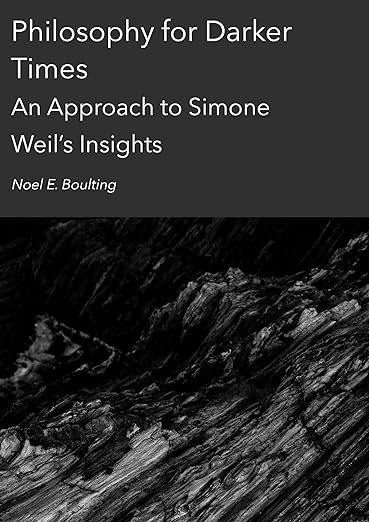
New Study Examines Weil’s Works
Noel Boulting, Philosophy for Darker Times: An Approach to Simone Weil’s Insights (Ethics International Press, May 12, 2023)
This important new study examines the work of Simone Weil; French mystic, social philosopher, and activist in the French Resistance in the Second World War. Weil’s posthumously published works had a major influence on French and English social thought. Philosophy for Darker Times relates Weil’s insights to specific significant issues in our own time.
New Book on Weil and Critical Theory
Benjamin P. Davis, Simone Weil’s Political Philosophy: Field Notes from the Margins (Rowman & Littlefield, 2023)
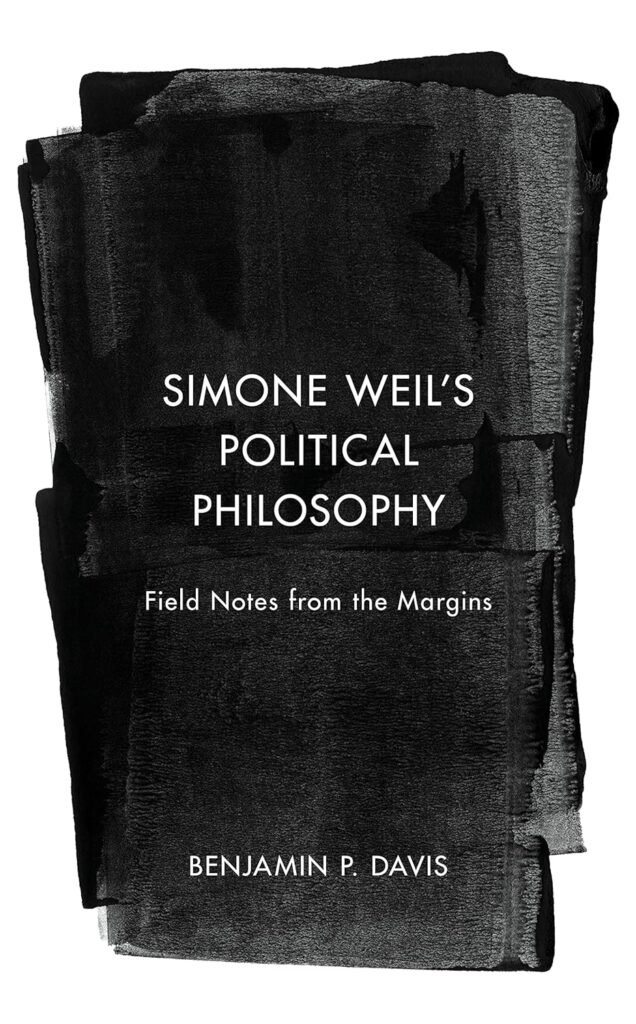
“[A] strikingly original portrait.” —Jessica Whyte, University of New South Wales
This book argues that Simone Weil’s short life (1909-1943) is best understood as deeply invested in and engaged with the world around her, which she knew she would leave behind sooner rather than later if she took risks on the side of the oppressed. To present Weil first and foremost as a political philosopher, Benjamin Davis places her work in conversation with feminist philosophy, decolonial philosophy, and Marxism.
Against the backdrop of Weil’s commitments, Davis reads Weil into debates in contemporary Critical Theory. He argues that in the battles of today, we need to reconnect with Simone Weil’s ethical and political imagination, which offers a critique of oppression as part of a deeper attention to the world.
A Weilian-Inspired Ecological Ethics
Kathryn Lawson, Ecological Ethics and the Philosophy of Simone Weil: Decreation for the Anthropocene (Routledge, May 13, 2024)
This book places the philosophy of Simone Weil into conversation with contemporary environmental concerns in the Anthropocene.
The book offers a systematic interpretation of Simone Weil, making her ethical philosophy more accessible to non-Weil scholars. Weil’s work has been influential in many fields, including politically and theologically-based critiques of social inequalities and suffering, but rarely linked to ecology. Kathryn Lawson argues that Weil’s work can be understood as offering a coherent approach with potentially widespread appeal applicable to our ethical relations to much more than just other human beings. She suggests that the process of ‘decreation’ in Weil is an expansion of the self which might also come to include the surrounding earth and a vast assemblage of others. This allows readers to consider what it means to be human in this time and place, and to contemplate our ethical responsibilities both to other humans and also to the more-than-human world. Ultimately, the book uses Weil’s thought to propose a decreative ecological ethics that decenters the human being by cultivating human actions towards an ecological ethics.
This book will be useful for Simone Weil scholars and academics, as well as students and researchers interested in environmental ethics in departments of comparative literature, theory and criticism, philosophy, and environmental studies.
On Attention: Murdoch and Weil
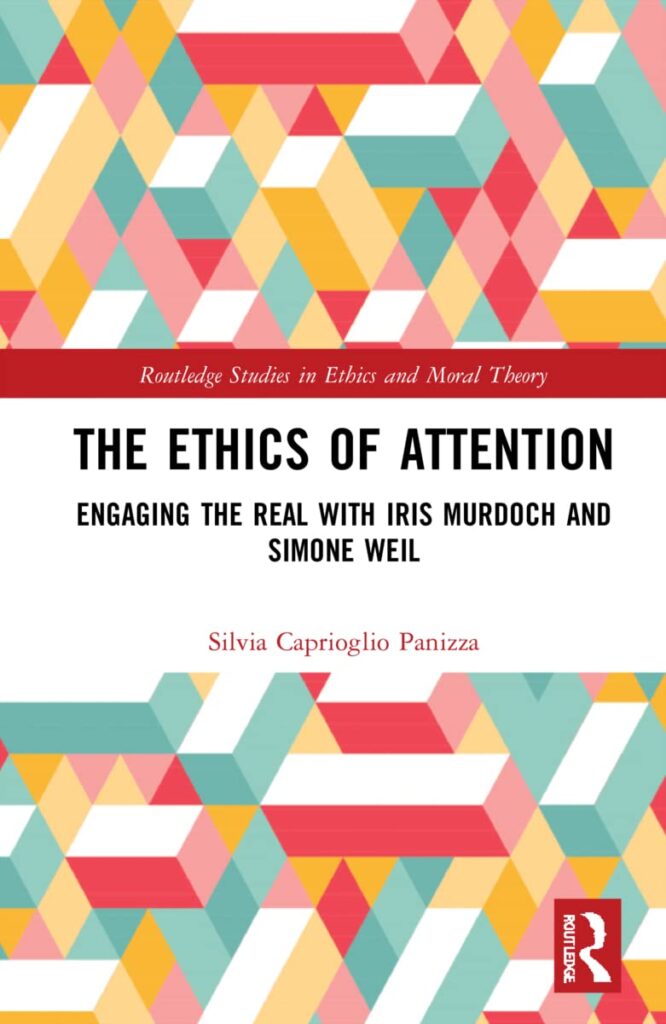
Silvia Caprioglio Panizza, The Ethics of Attention: Engaging the Real with Iris Murdoch and Simone Weil (Routledge, 2022)
This book draws on Iris Murdoch’s philosophy to explore questions related to the importance of attention in ethics. In doing so, it also engages with Murdoch’s ideas about the existence of a moral reality, the importance of love, and the necessity but also the difficulty, for most of us, of fighting against our natural self-centred tendencies.
Why is attention important to morality? This book argues that many moral failures and moral achievements can be explained by attention. Not only our actions and choices, but the possibilities we choose among, and even the meaning of what we perceive, are to a large extent determined by whether we pay attention, and what we attend to. In this way, the book argues that attention is fundamental, though often overlooked, in morality. While the book’s discussion of attention revolves primarily around Murdoch’s thought, it also engages significantly with Simone Weil, who introduced the concept of attention in a spiritual context. The book also engages with contemporary debates concerning moral perception and motivation, empirical psychology, animal ethics, and Buddhist philosophy.
The Ethics of Attention will be of interest to researchers and advanced students working on Iris Murdoch, Simone Weil, ethics and moral psychology, and the philosophy of attention.
New Foreword to Intimations of Christianity
Christopher Hamilton, foreword, Intimations of Christianity Among the Ancient Greeks (2023)
3 Recommendations
